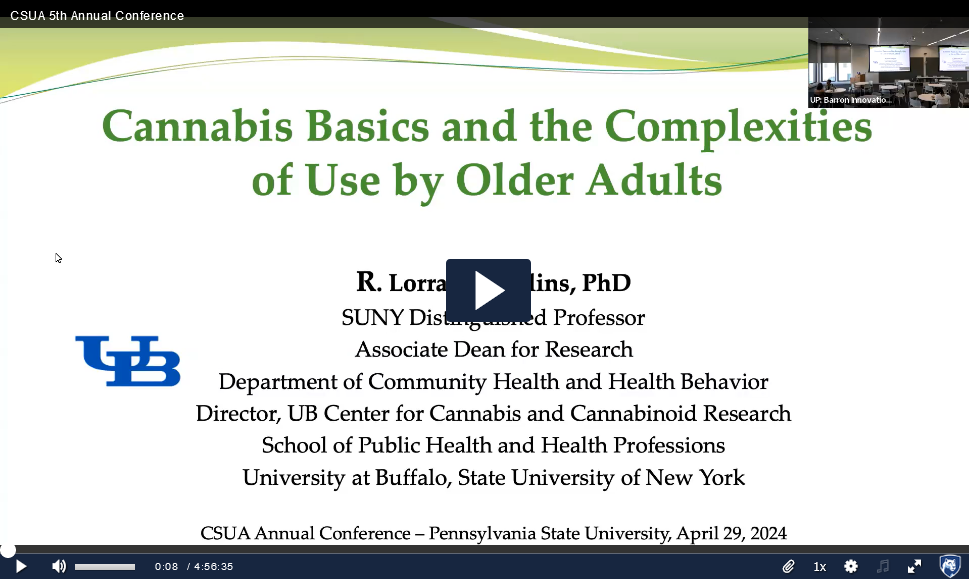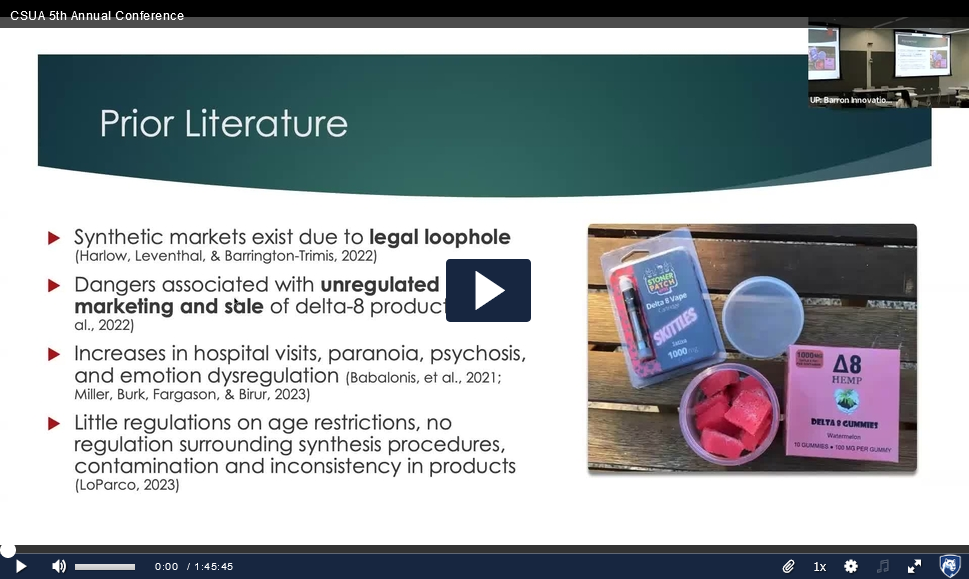2025 CSUA Conference
The Penn State Consortium on Substance Use and Addiction (CSUA) hosted its sixth annual conference on Monday, May 5 in the Eric J. Barron Innovation Hub at the University Park campus. For more information, visit the 2025 conference page.
Zoom recording: 2025 CSUA conference livestream
2024 Annual Conference
The Social Science Research Institute’s (SSRI) Consortium on Substance Use and Addiction (CSUA) recently hosted its fifth annual conference in the Eric J. Barron Innovation Hub at the University Park campus on Monday, April 29, 2024. Drawing over 140 attendees throughout the day including through the Zoom livestream, the conference kicked off with a welcome from Paul Griffin, the outgoing director of CSUA and professor of industrial and manufacturing engineering.
2023 Annual Conference
The Penn State Consortium on Substance Use and Addiction (CSUA) hosted its fourth annual conference in the HUB-Robeson Center at the University Park campus on Monday, May 1. Drawing over 150 attendees throughout the day, including through the Zoom livestream, the conference kicked off with a welcome from Paul Griffin, the director of CSUA and professor of industrial and manufacturing engineering.
Read the full article about the 2023 conference. View the 2023 agenda.
2022 Substance Use Disorder Stigma Reduction Summit
On Thursday, September 22, 2022, CSUA held the first annual Summit on Substance Use Disorder Stigma Reduction. The summit was an interdisciplinary event that brought together practitioners and scholars from a range of fields (e.g., public health, government and public policy, psychology, criminal justice) to consider research, policy, and practice around the issue of stigma reduction in the field. This event was supported by generous contributions from the Penn State Consortium on Substance Use and Addiction and The Douglas W. Pollock Center for Addiction Outreach and Research. View the 2022 agenda.
The summit's keynote speaker was Dr. Alex Elswick. Dr. Alex Elswick is a tireless advocate for people with substance use disorders. He currently serves the University of Kentucky as an Assistant Professor and Extension Specialist for Substance Use Prevention and Recovery. Alex is a trained researcher, recovery coach, and mental health therapist, as well as the co-founder of Voices of Hope, a peer-driven recovery community organization. But most importantly, Alex is himself a person in long term recovery from the chronic disease of addiction.
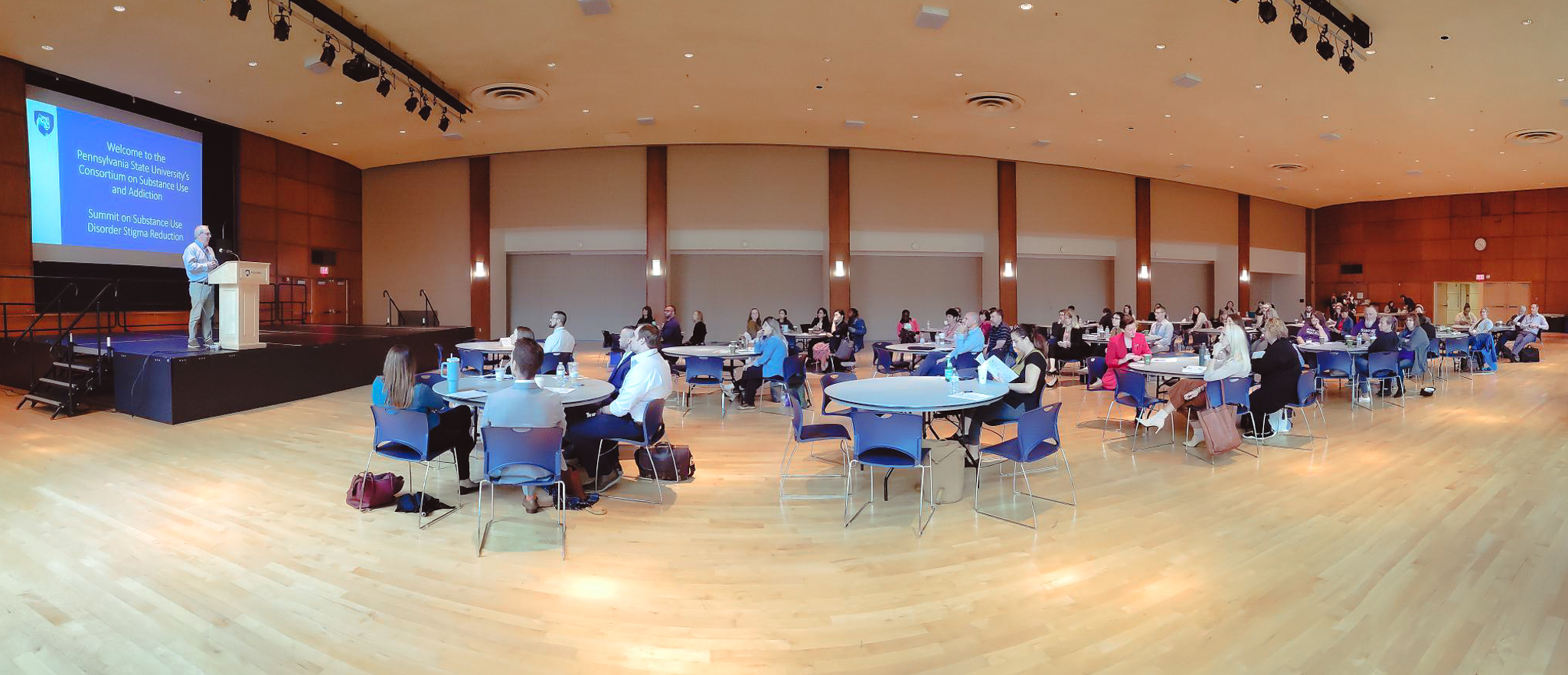
2022 Conference
The Penn State Consortium on Substance Use and Addiction (CSUA) hosted its second annual conference, “Community Approaches to Substance Use and Addiction” on Monday, May 3.
Held virtually via Zoom and drawing over 120 attendees throughout the day, the conference kicked off with a welcome from Paul Griffin, the director of CSUA and professor of industrial and manufacturing engineering, and an introduction of the keynote speaker from Stephanie Lanza, former CSUA director and the director of the Edna Bennett Pierce Prevention Center.
Read the full article about the 2022 conference.
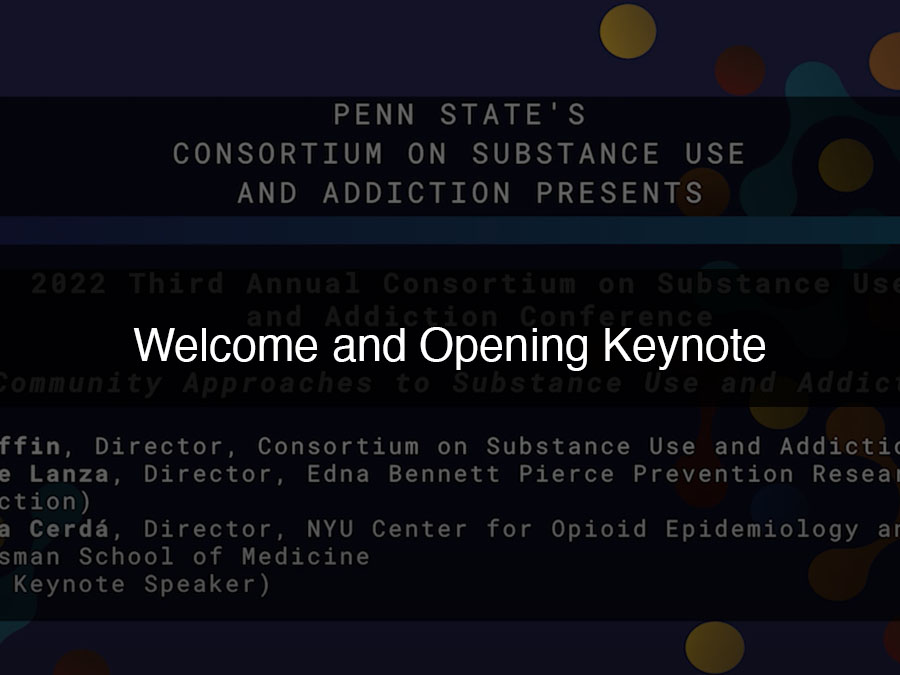
2022 Welcome and Opening Keynote
- Conference Welcome (Paul Griffin, Director, Consortium on Substance Use and Addiction)
- Introduction of Keynote Speaker (Stephanie Lanza, Director, Edna Bennett Pierce Prevention Research Center)
- Magdalena Cerdá – Director, NYU Center for Opioid Epidemiology and Policy, NYU Grossman School of Medicine
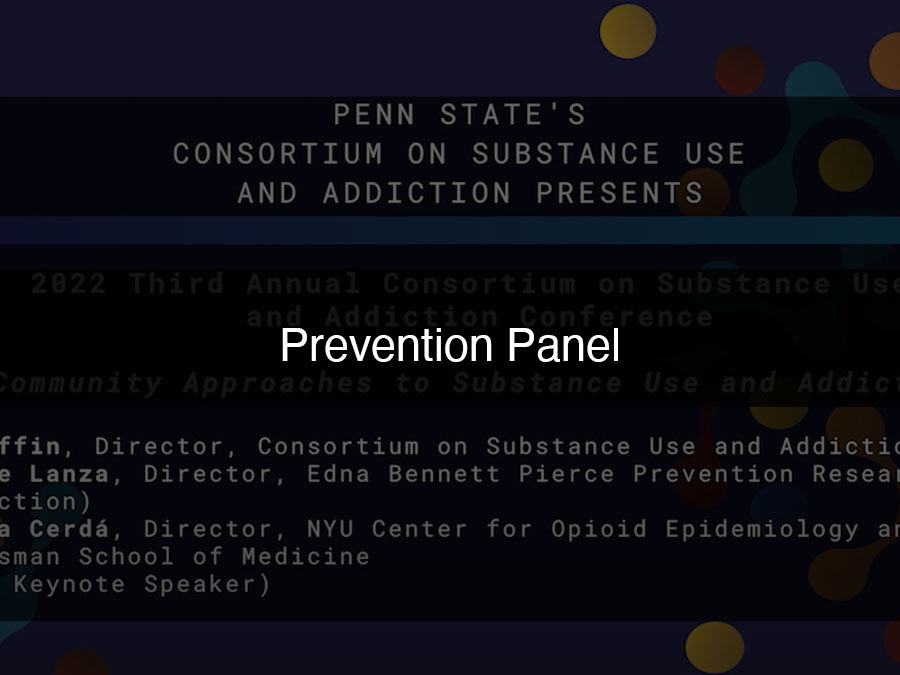
- Megan Affrunti – Director of Substance Use Disorders and Recovery, Clinton Foundation
- Darigg Brown – Program Manager, Substance Use Prevention, Evaluation, and Research, RTI International
- Rina Eiden – Department of Psychology, Penn State University Park
- Moderator – Kelly Rulison, Human Development and Family Studies, Penn State University Park
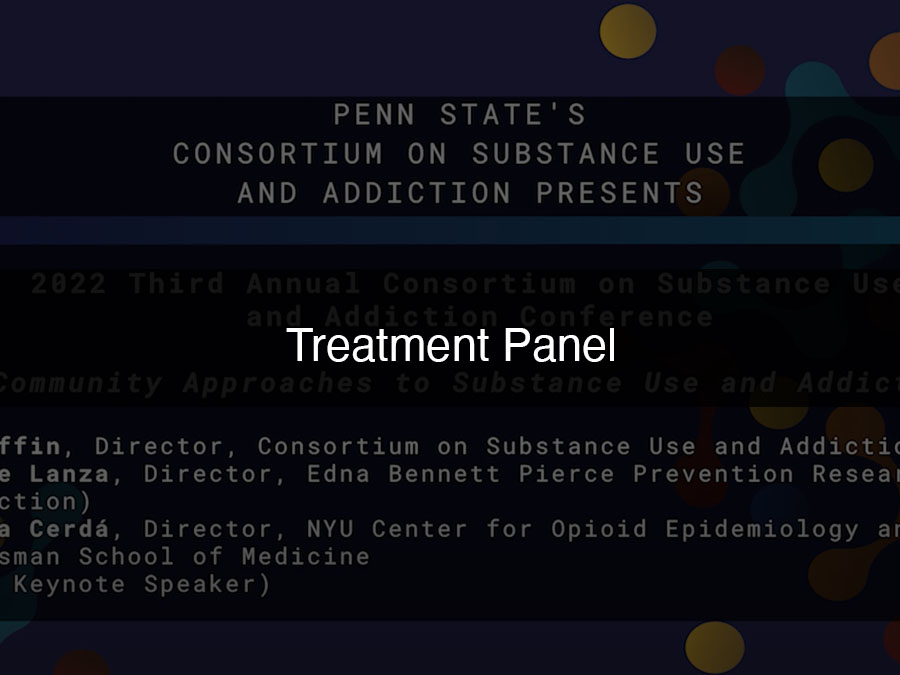
- Mike Gersz – Director of Outpatient Services, Maryhaven
- Anthony Folland – Clinical Services Manager and Opioid Treatment Authority Director, Alcohol and Drug Abuse Programs, Vermont Department of Health
- Brooke Hiltz – Community Program Manager, The HEALing Communities Study, University of Kentucky
- Christopher Cook – Treatment Program Manager, The HEALing Communities Study, University of Kentucky
- Moderator – Sarah Kawasaki, Psychiatry and Behavioral Health and Internal Medicine, Penn State College of Medicine
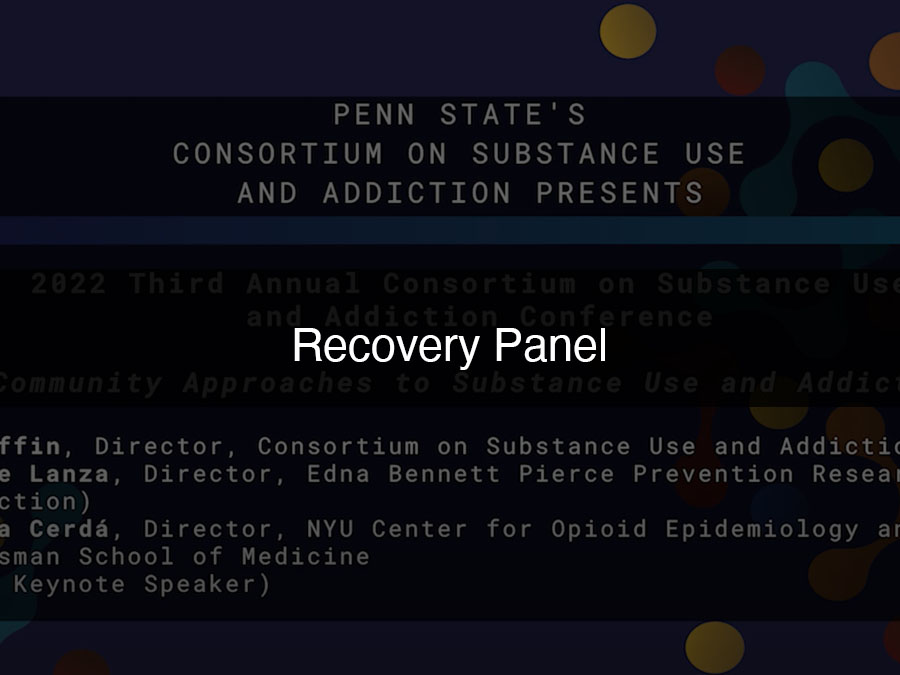
- Hobart (Bo) Cleveland, III – Human Development and Family Studies, Penn State University Park
- Philip Rutherford – Chief Operating Officer, Faces & Voices of Recovery
- Jason Whitney – Program Coordinator, Collegiate Recovery Community, Penn State University Park
- Moderator – Kristina Brant, Agricultural Economics, Sociology and Education, Penn State University Park
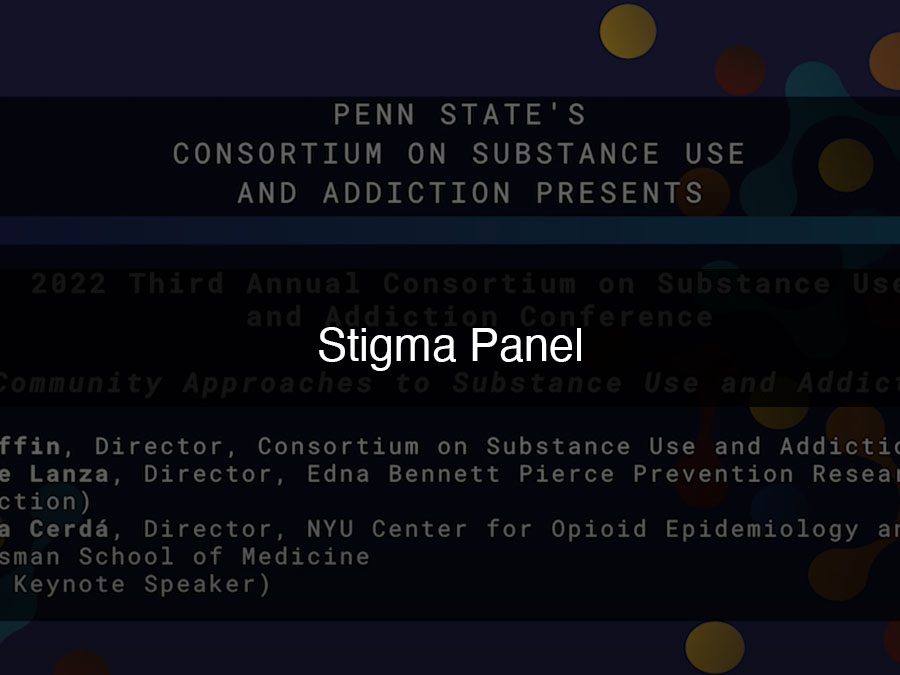
- Jordan Lewis – Director of Policy, Pennsylvania Department of Drugs and Alcohol Program (DDAP)
- Jennifer Murphy – Department of Criminal Justice, Penn State Berks
- Joe Pyle – President, Scattergood Foundation
- Moderator – Glenn Sterner – Criminal Justice, Penn State Abington
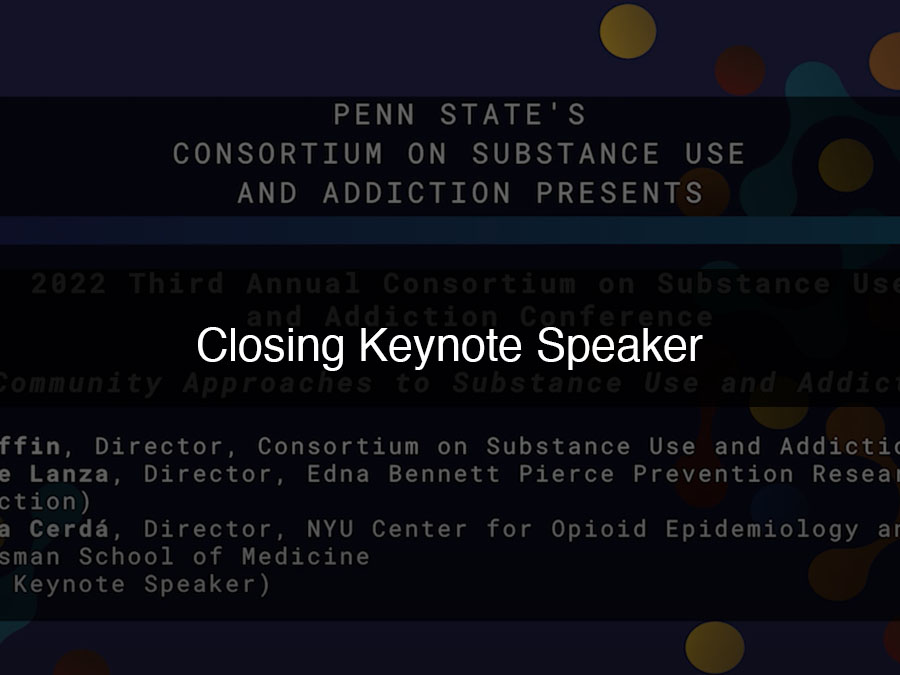
- Introduction of Keynote Speakers (Joel Segel, Health Policy and Administration, Penn State University Park)
- Josh Shapiro – Pennsylvania Attorney General
- Jennifer Selber – Pennsylvania Executive Deputy Attorney General
Spring Speaker Series - Sam Quinones
UNIVERSITY PARK, Pa. - The Social Science Research Institute's Consortium on Substance Use and Addiction (CSUA) and the Criminal Justice Research Center hosted a virtual talk with Sam Quinones on March 23, titled "True Tales of America and Hope in the Time of Fentanyl and Meth with Sam Quinones.”
During the talk, Quinones talked about writing his books and completing research on the changing landscape of the opioid crisis in the last several years, the appearance of fentanyl and how it replaced other forms of opiates like prescription pills and heroin, the usage of Narcan, opioid lawsuits, and other related substance use and addiction topics. He also answered submitted questions during the Q&A part of the session.
“How do you treat a very complicated problem originating in the central nervous system with one pill? In this country, we need to address it in a multidisciplinary way,” said Quinones on the topic of the overprescribing of opioids in the United States. “For example, I think one of the important things we absolutely need to do is rethink using prison first as a place for recovery.”
Quinones is a journalist, storyteller, former Los Angeles Times reporter, and author of three acclaimed books of narrative nonfiction. He is the author of "Dreamland: The True Tale of America's Opiate Epidemic" and several other titles including his most recent release, “The Least of Us: True Tales of America and Hope in the Time of Fentanyl and Meth.” His career as a journalist has spanned almost 30 years. He lived for 10 years as a freelance writer in Mexico, where he wrote his first two books.
Housed in the Social Science Research Institute, the CSUA draws on the expertise of researchers, educators and practitioners from across Penn State to develop and implement effective programs, policies and practices aimed at preventing and treating addiction and its spillover effects on children, families, and communities.
The full talk is available on YouTube.
2021 Conference
The Penn State Consortium to Combat Substance Abuse (CCSA) hosted its second annual conference, “Addressing Substance Use: Cross-Systems Solutions,” on Monday, May 3.
Held virtually via Zoom and drawing over 120 attendees throughout the day, the conference kicked off with a welcome from Stephanie Lanza, outgoing CCSA director, professor of biobehavioral health and director of the Penn State Edna Bennett Prevention Research Center (PRC), along with opening remarks from Penn State President Eric Barron.
Read the full article about the 2021 conference.
2019 Conference
Penn State’s Consortium on Substance Use and Addiction hosted the inaugural conference, “Envisioning a Future Free from Addiction: Research, Programs, and Practice to Prevent Substance Abuse,” on April 29th, 2019. The conference kicked off with a community engagement breakfast featuring presentations from Penn State Vice President for Research Neil Sharkey and Geoff Kolchin of the Pennsylvania Commission on Crime and Delinquency, among others.
Penn State President Eric J. Barron and Congressman Glenn Thompson (R-PA) welcomed conference attendees after being introduced by Stephanie Lanza, interim director of the CSUA and director of the Edna Bennett Pierce Prevention Research Center.
Barron emphasized Penn State’s pledge to combat substance abuse in Pennsylvania, noting that the University's commitment to enhancing health is part of it’s land-grant mission.
“With 24 campuses spread across the Commonwealth, Penn State has a campus within 30 miles of 96 percent of Pennsylvanians," said Barron. "We have tremendous reach, and the potential to have an impact on this crisis is strong.”
Thompson said, “There's not a zip code in this country that hasn't been impacted by substance abuse," and called the epidemic "the public health crisis of our lifetime.”
A session on preventing the next substance abuse epidemic from a national perspective began with a keynote address from Thomas McLellan, former deputy director in the Office of National Drug Control Policy during the Obama administration. McLellan summarized findings from the 2016 Surgeon General’s Report, noting how increasing prices and taxes on alcohol has reduced drinking by 30 percent. He also detailed the government’s success in reducing cigarette smoking.
“A steep decline in smoking rates over the last 50 years is the result of good science in partnership with the government and communities," said McLellan. "Penn State can leverage its resources to do the same for substance misuse.”
Following a poster session and round-table networking discussions about breaking down barriers to address substance abuse, the afternoon sessions focused on substance abuse prevention and forming new partnerships to move forward. Glenn Sterner, assistant professor of criminal justice at Penn State Abington, presented key findings from his collaborative work with opioid users in four Pennsylvania counties.
“Nearly one-third of opioid users have overdosed in the past year, and two-thirds of those have overdosed more than once. We need to think about how these substances are coming into our communities," he stated.
Janet Welsh, associate research professor at Penn State and principal investigator of the EPiSCenter, outlined the PROSPER project, designed to deliver evidenced-based interventions to youth in collaboration with cooperative extension in numerous Pennsylvania counties.
“Reaching the 15,000 youth within PROSPER with interventions to prevent prescription drug misuse would lead to over $6.75 million in short-term societal benefits and could lead to major public health impacts,” she said.
Penn State Health researcher Dr. Sarah Kawasaki discussed a coordinated hub-and-spoke approach to the treatment of substance use disorder in central Pennsylvania, led by Penn State Hershey.
“The number of opioid overdose deaths has now surpassed the number of HIV deaths in this country. The hub-and-spoke model, with the hub located in Harrisburg and spokes spanning seven counties, is providing a continuum of care for opioid treatment and includes community health clinics, drug free counseling facilities, regional ERs, inpatient units, rural clinics, pain management, and probation/parole services,” Kawasaki stated.
Pennsylvania Secretary of Health Dr. Rachel Levine wrapped up the afternoon sessions by explaining the history of opioid and heroin addiction in Pennsylvania and the Commonwealth’s three-pillared response to the crisis: prevention, rescue and treatment.
Levine has advocated for a number of initiatives in the state, including the Opioid Stewardship Program, which works with medical schools to provide education on pain management, and the Prescription Drug Monitoring Program, an online tool to help physicians identify patients who are struggling with opioid addiction. The program has contributed to the reduction in opioid prescriptions in the state by 25 percent. In addition, Levine has advocated for the PA Prescription Drug Take-Back Program, with 813 take-back boxes spread across the state, including locations near University Park.
In 2018, Levine signed a standing order for first responders and the general public to expand Naloxone access, and spearheaded last year’s Naloxone Day where over 6,000 free Naloxone kits were distributed.
“Naloxone is a unique drug, its only purpose is to reverse opioid overdose and save lives,” Levine explained. There will be another Naloxone Day occurring this summer.
“While we are in the sixth iteration of 90-day statewide disaster declaration to help combat the heroin and opioid overdose epidemic, last year for the first time in five years, [Pennsylvania] saw a significant decrease in overdose deaths. We have bent the curve,” Levine concluded.
Thank you to our sponsors and partners for this event:
Penn State Outreach, Addiction Center for Translation, Center for Applied Studies in Health Economics, Center for Educational Disparities Research, Center for Geriatric Nursing Excellence, Child Maltreatment Solutions Network, Child Study Center, Clearinghouse for Military Family Readiness, College of Nursing, Clinical and Translational Science Institute, Evidence to Impact Collaboratory, Huck Institute, The Methodology Center, Population Research Institute, Rock Ethics Institute, Bennett Pierce Prevention Research Center, College of Agricultural Sciences, College of Communications, College of Education, College of Health and Human Development, College of Medicine, Office of Government Affairs, Penn State Law, Office of the Vice President for Commonwealth Campuses.
